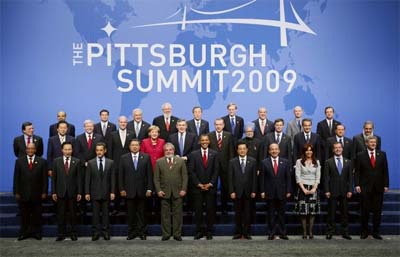With a smaller number of richer and more powerful me mbers, G8 will continue to be seen as the real power centre or the ‘high table of global governance’. One cannot see any hosting country being able to prevent another G8 member from bringing up a burning economic or financial problem during a G8 Summit. Therefore, the ‘Us and Them’ divide between advanced and dynamic emerging economies on the one hand and advanced economies on the other, will persist and this will not make for real and effective coordination.
The US seems quite prepared to replace G8 with G20. The real resistance, I am told, comes from relatively smaller powers such as the UK, Canada and Japan, who visualise a dilution of their global stature as a consequence. Perhaps, it will take time before the recognition sets in that a larger forum for global governance is more reflective of the present multi-polar world and will be more effective in preventing any unilateral behaviour in the future.
The second major announcement concerns the role and management of the International Monetary Fund (IMF). The context for this changed role is to be provided by the ‘Framework for Strong, Sustainable and Balanced Growth’, which was launched at Pittsburgh and which visualises putting in place ‘…a process whereby we set out our objectives, put forward policies to achieve these objectives, and together assess our progress.’ This is indeed revolutionary, because it implies that the biggest and most advanced economies will be required to ensure that their macroeconomic policies don’t simply serve their national goals but are designed to take into account the externalities that these generate for the global economy.
The IMF has been asked to undertake a ‘… candid, even-handed, and balanced analysis of our policies,’ and develop a ‘… forward looking analysis of whether policies pursued by individual G20 countries are collectively consistent with more sustainable and balanced trajectories for the global economy.’ The IMF will need to build on the existing surveillance mechanism and be truly neutral, unbiased and, most importantly, sufficiently competent technically to be able to analyse the risks inherent in national policies and assess their overall impact on other economies operating in an increasingly integrated global economy.
The Fund’s past record in this regard has been somewhat weak. It has on various occasions either been unable to see a looming crisis (as in its Article IV consultations quite often presenting an outcome, which has been quite at odds from unfolding realities subsequently) or has pulled its punches to avoid ruffling feathers in national capitals. Partly though, this has been a consequence of hypersensitivity on the part of member countries to any critical evaluation of their policies. This is especially true of both the advanced and larger emerging economies.
The marked bias in the selection of staff in favour of a particular kind of economic and quantitative skills has also tended to sustain dogmas and succumb to ‘one size fits all’ approaches. All G20 members will have to accept some surrender of economic and financial sovereignty to the IMF and the newly broadened and more empowered Financial Stability Board if the Fund is to effectively discharge its additional responsibilities.
One of the decisions from the summit is to shift at least 5 per cent of quota share in the IMF to more dynamic emerging markets and developing countries from over-represented countries ‘using the current quota formula as the basis to work from.’ Given that the present quota formula principally relies on the country’s share in global output and trade, it is not clear how this shift will be brought about except for China and a couple of advanced economies.
One of the suggestions at the pre-Pittsburgh Washington meeting was to also include population as one of the criteria for quota reallocation to facilitate this shift. The summit has also called upon ‘… our Finance Ministers and Central Bank Governors to launch the new Framework by November by initiating a cooperative process of mutual assessments of our policy frameworks and the implications …for the pattern and sustainability of global growth.’
India and other large emerging economies will have to develop the capacity for participating in this mutual assessment of national policies and global trends so as to be able to analyse their impact on their own economic prospects. In our case, this may be best achieved by setting up a joint working group of the Ministry of Finance and the Reserve Bank of India that can undertake, with needed inputs from outside experts, an assessment of evolving global economic conditions and their impact on the economy. Creating such a capacity should be seen as the necessary condition for effective future participation in the G20 process and for possibly hosting the summit in 2012 after Canada, Korea and France, which have already been identified as the next three hosts.
Rajiv Kumar is Director and Chief Executive of Indian Council for Research in International Economic Relations (ICRIER).
This article also appeared here in the Financial Chronicle.

